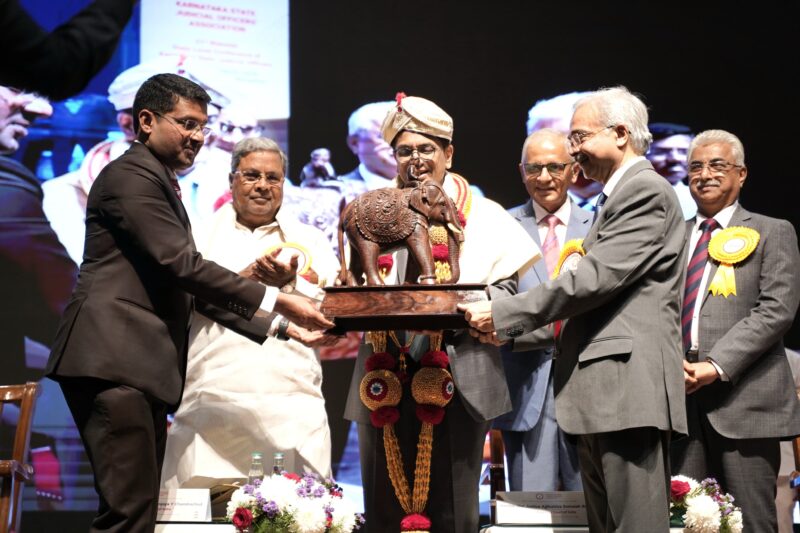Dr.Thomas (Special Correspondent)
Theme Of The Conference
*Equity And Excellence For Futuristic Judiciary
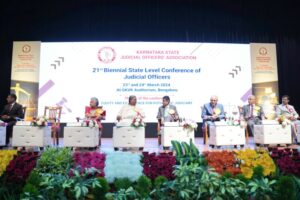
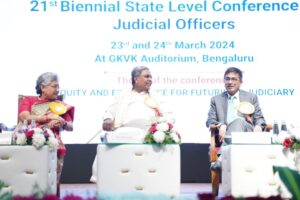
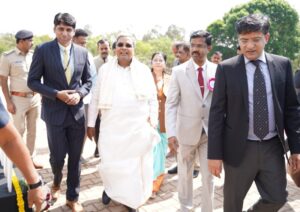
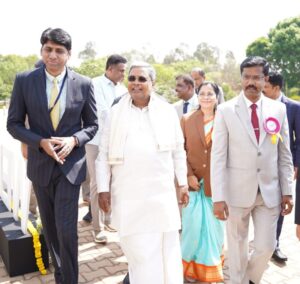
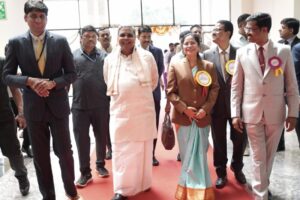
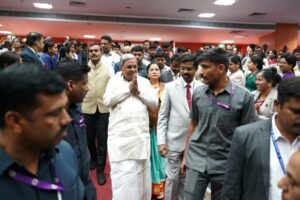
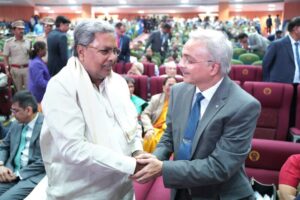
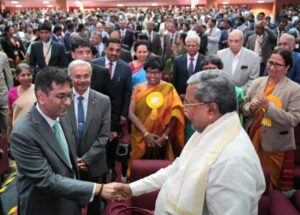
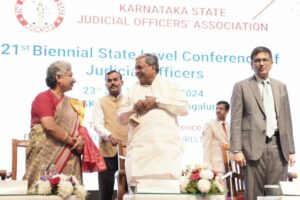
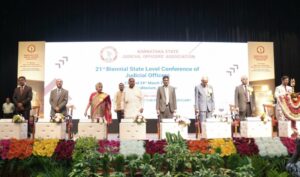
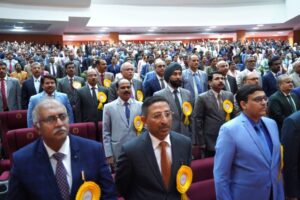
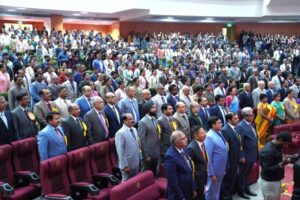
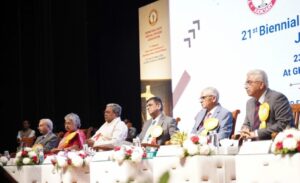
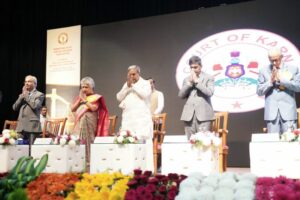
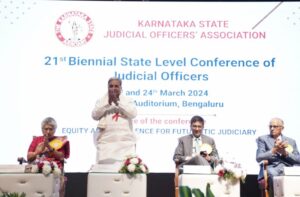
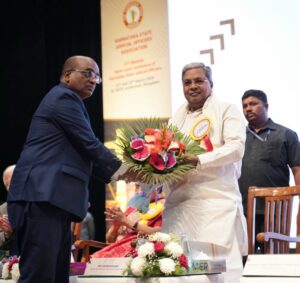
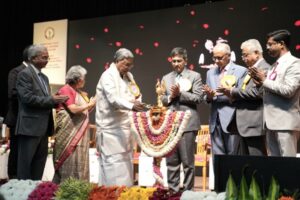
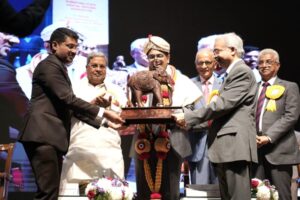
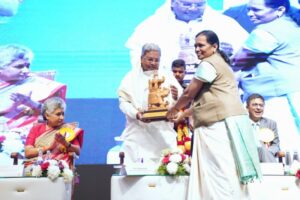
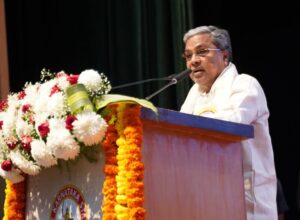
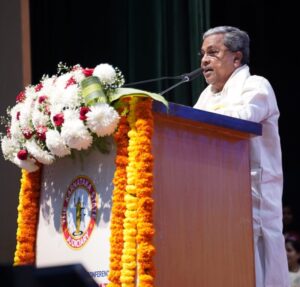 1.I am pleased to be part of this August gathering on the occasion of 21st Biennial State Level Conference of Judicial Officers.
1.I am pleased to be part of this August gathering on the occasion of 21st Biennial State Level Conference of Judicial Officers.
2. It is an absolute pleasure to welcome the esteemed Chief Justice of India,Justice Dhananjaya Y. Chandrachud along with all distinguished participants, to this Conference here in Karnataka.
My Journey Inspired by Justice and Judiciary System
3.As I stand before this esteemed assembly,I am filled with profound respect for each member present here today.
The judiciary, the cornerstone of a just and equitable society, has always been one of the sources of inspiration for me.
It is this sacred institution, with its unwavering commitment to fairness,good conscience, reasonableness,and justice, that initially drew me to the field of law.
4.The judiciary’s role as the ultimate guardian of rights and liberties resonated deeply with my own aspirations to serve society.
Witnessing the judiciary’s dedication to ensuring inclusiveness and equality, and its pivotal role in safeguarding all that is good and just,has been a guiding light in my journey.
Significance of Judiciary in Ensuring Equity and Excellence:
5.The Constitution of India,alongside its judiciary, stands as a beacon of equity and excellence, embodying the core principles of justice,equality,and the unwavering pursuit of an equitable society.
6.By architecting a Constitution that champions the rights of the marginalized and embodies the principles of justice and equality,Baba Saheb Ambedkar laid the groundwork for a judiciary that stands as a guardian of these ideals.
7.The modern Indian justice system, enriched by this legacy, also draws its values from the teachings of Buddha, Basavanna,Narayana Guru,the enlightening Vachanas and many progressive thinkers of our nation, which collectively emphasize inclusivity,compassion, and the need for societal reform.
This confluence of visionary leadership and rich cultural ethos has shaped a justice system that aspires not just to adjudicate,but to uplift and transform society.
8. The Indian Judiciary has made the country proud by its landmark Judgements upholding the rights of the people.
Especially,the Supreme Court has lived up to the expectation of Dr.Babasaheb Ambedkar–the Architect of the Constitution, who hailed Article 32 (Judicial Review Through writs) as the heart and soul of the Constitution.
9.Through landmark judgments, the courts have expanded individual freedoms and championed social justice, enhancing transparency and accountability within government institutions.
Its historical evolution from a colonial apparatus to an independent arbiter underscores its pivotal role in shaping India’s legal landscape.
Judiciary in the Recent Times
10.While the members of the judiciary have been working tirelessly to overcome the challenges facing the system and to stay true to their responsibilities,it is equally important to pause and reflect on the approach and question how one could be more effective in achieving the larger purpose.
11.On this note I am reminded of the efforts of Hon’ble Chief Justice Dhananjaya Y Chandrachud in leading the Indian judiciary in the right direction.
Acknowledging the predominant role of the Supreme Court as the apex court,he shifted focus to long pending Constitutional Bench matters that have a profound impact on the direction of our legal jurisprudence and on the lives of Indians.
12.In the face of societal trends reminiscent of Jain philosophy’s Avasarpini,marked by a decline in morality and virtue, the judiciary’s role becomes crucial.
The judiciary’s duty extends beyond legal interpretation to moral stewardship,guiding society towards virtue and integrity.
Through its wisdom and actions,the judiciary can inspire a moral renaissance,steering society away from decline and towards a path of communal harmony and elevated ethical standards,embodying the resilience and guidance necessary for societal upliftment.
Equity and Excellence For Futuristic Judiciary
13.The theme of this conference,Equity and Excellence For Futuristic Judiciary,’resonates deeply with the ethos of our democratic society and the imperatives of our time.
14. In the quest for a futuristic judiciary, ensuring the aspects of Accessibility,Availability, and Affordability is crucial for fostering social inclusion and equality within the justice system.
The pursuit of these principles is a moral imperative to ensure that justice is not a privilege of the few but a fundamental right of all.
15. Accessibility to justice means that every citizen, irrespective of their socio-economic status,geography, or literacy levels,should find the doors of our courts open to them.
16. The use of digital platforms and e-courts is a step in the right direction,allowing for seamless filing of cases, hearing schedules,and even virtual court proceedings, thus breaking down the barriers of distance and time.
17.Availability of justice implies that our judiciary is equipped to handle the volume of cases brought before it.
The perennial challenge of case backlog threatens the very principle of ‘justice delayed is justice denied.’It is imperative that we adopt a multi-pronged strategy to address this issue.
18.Affordability of justice is a critical concern that affects the very essence of equitable justice.Legal aid services must be strengthened and made more robust to ensure that the economically weaker sections of our society are not denied justice due to the lack of financial resources.
We must work towards a system where legal aid is not just a service but a guarantee of our justice system.
19. Language should not be a barrier to justice.The use of the local language in court proceedings, or the integration of Artificial Intelligence to provide real-time updates and translations,can significantly enhance the understanding and participation of litigants in the judicial process.
This not only makes the courts more accessible but also instills a greater sense of trust and confidence in the judiciary among the common people.
Conclusion
20. In our relentless pursuit of justice and equity,both the State and Judiciary have historically been more powerful than the society,courageously confronting and dismantling the social evils that have long shackled our society.
The State has firmly stood against terrible practices like sati and untouchability, and the unfairness of child marriage, driven by a belief in promoting freedom and empowering people.
21. Through transformative initiatives like land reforms and the enshrining of rights for women, we have not only challenged the status quo but have laid the groundwork for a society that values and upholds the dignity of every individual.
These actions reflect a profound commitment to rectifying historical wrongs and fostering an environment where equality and justice are not mere ideals but lived realities.
22. We the people of India resolved to constitute India into a Sovereign Democratic Republic Socialist Secular as stated in the preamble.
First twenty five years saw the nation making steady progress towards establishing a welfare state. By 1973 India had taken bold and beautiful measures.
23. As we stand on the shoulders of these monumental achievements, the task before us – the legislature and judiciary alike – is twofold. Firstly, we must continue to identify and address the social concerns that persist, evolving our approaches and strategies to meet the complex demands of our times.
Secondly,we must rigorously ensure that the provisions and reforms already in place are effectively implemented,truly transforming lives and uprooting the remnants of social evils.
24. This dual commitment to action and vigilance embodies the philosophy that guides us: a belief in the relentless pursuit of a just society,where inclusivity, inclusive growth, plurality and equality are not aspirational goals but the very foundations upon which our nation is built.
It is through this shared vision and unwavering dedication that we can continue to forge a future marked by social justice and the empowerment of every citizen.
25. As said by our Poet Laureate Kuvempu, our shared vision should be to realise.A peaceful land of all communities
26. I look forward to the productive and insightful deliberations over the course of this conference.

